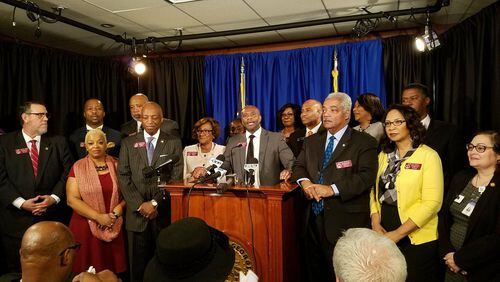Saying a similar proposal introduced last week does not go far enough, members from the Georgia Legislative Black Caucus filed legislation that would make it illegal to commit a "violent crime" against someone based on qualities such as their race, gender or sexual orientation.
State Rep. Karen Bennett, D-Stone Mountain, and state Sen. Lester Jackson, D-Savannah, filed bills in their respective chambers that would create new hate crime offenses in state law.
Georgia is one of five states that does not have a hate crimes law on the books. A 2000 hate crimes law was struck down by the Georgia Supreme Court in 2004 for being “unconstitutionally vague.”
“Crime driven by hate and malice requires serious penalties that deter people and provide justice to its victims,” said Jackson, the caucus’ chairman.
The legislation, Senate Bill 316 and House Bill 663, would create new offenses when someone is accused of committing an assault, battery or destruction of property based on someone's race, color, religion, gender, disability, sexual orientation, gender identity or expression, national origin, or ethnicity.
If someone is convicted of, for example, aggravated battery against a person protected by the law, he or she would face five to 20 years in prison. Current law requires someone convicted of aggravated battery to be sentenced to at least one year.
In House Bill 660, filed last week by state Rep. Meagan Hanson, R-Brookhaven, a person first would be convicted of a crime, such as aggravated battery, and then a jury could increase that person's sentence by anywhere from three months to two years, based on the severity of the crime.
Bennett said creating a separate crime would give attorneys additional tools to prosecute someone accused of a hate crime.







